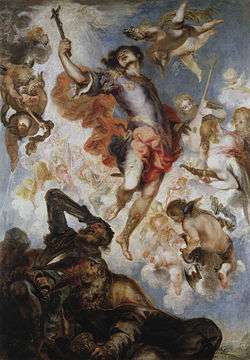Hermenegild
Saint Hermenegild or Ermengild (died 13 April 585) (Spanish: San Hermenegildo, from Gothic *Airmana-gild, "immense tribute"), was the son of king Liuvigild of the Visigothic Kingdom in the Iberian Peninsula and southern France. He fell out with his father in 579, then revolted the following year. During his rebellion, he converted from Arianism to Chalcedonian Christianity. Hermenegild was defeated in 584 and exiled.[2] His death was later celebrated as a martyrdom due to the influence of Pope Gregory I's Dialogues, in which he portrayed Hermenegild as a "Catholic martyr rebelling against the tyranny of an Arian father."[3]
Saint Hermenegild | |
|---|---|
 El Triunfo de San Hermenegildo by Francisco Herrera the Younger (1654) | |
| Martyr | |
| Born | Toletum, Visigothic Kingdom |
| Died | c. 13 April 585 Hispalis, Hispania |
| Venerated in | Catholic Church, Eastern Orthodox Church |
| Feast | April 13 |
| Attributes | axe, crown, sword, and cross [1] |
| Patronage | Seville, Spain |
Marriage to Ingund
Hermenegild was the eldest son of the Liuvigild and his first wife, Princess Theodosia (a Chalcedonian Christian.) [4] He was brother to Reccared I and brought up an Arian. Liuvigild made his sons co-regents.[5]
In 579 he married Ingund, daughter of the Frankish King Sigebert I of Austrasia who was a Chalcedonian Christian. Her mother was the Visigoth princess Brunhilda of Austrasia. The twelve-year-old Ingund was pressured by Hermenegild's stepmother Goiswintha to abjure her beliefs, but she stayed firm in her faith.[6]
Liuvigild sent Hermenegild to the south to govern on his behalf. There he came under the influence of Leander of Seville, older brother of Isidore of Seville. Hermenegild was converted to Chalcedonian Christianity. His family demanded that he return to Arianism, but he refused.
Around this time, he led a revolt against Liuvigild. Contemporary accounts attribute this to politics rather than primarily to religious differences.[7] He asked for the aid of the Byzantine Empire but they were occupied with defending against territorial incursions by the Sasanian Empire [8] For a time Hermenegild had the support of the Suebi, who had been defeated by Liuvigild in 579. However, Liuvigild forced them to capitulate once again in 583.[5]
Hermenegild fled to Seville and when that fell to a siege in 584 went to Córdoba. After Liuvigild paid 30,000 pieces of gold, the Byzantines withdrew, taking Ingund and her son with them.[5] Hermenegild sought sanctuary in a church. Liuvigild would not violate the sanctuary. He sent Reccared inside to speak with Hermenegild and to offer peace. This was accepted and peace was made for some time.[4]
Imprisonment and death
Goiswintha, however, brought about another alienation within the family. Hermenegild was imprisoned in Tarragona or Toledo. During his captivity in the tower of Seville, an Arian bishop was sent to Hermenegild for Easter but he would not accept the Eucharist from him.[9] King Liuvigild ordered him beheaded; he was executed on 13 April 585.[4]
See also
- Saint Hermenegild, patron saint archive
Footnotes
- Stracke, Richard (2015-10-20). "Saint Hermenegild: The Iconography". Christian Iconography.
- Heather, Peter (1998). The Goths. Wiley. pp. 280–282. ISBN 978-0-631-20932-4.CS1 maint: ref=harv (link)
- Markus, Robert Austin (9 October 1997). Gregory the Great and His World. Cambridge University Press. p. 165. ISBN 978-0-521-58608-5.CS1 maint: ref=harv (link)
- Kirsch, Johann Peter. "Saint Hermengild." The Catholic Encyclopedia. Vol. 7. New York: Robert Appleton Company, 1910. 28 Jan. 2013
- Frassetto, Michael (2003). Encyclopedia of Barbarian Europe: Society in Transformation. ABC-CLIO. ISBN 978-1-57607-263-9.CS1 maint: ref=harv (link)
- Gregory of Tours translated by Lewis Thorpe, History of the Franks (Harmondsworth: Penguin, 1974,) page 302
- "Hermenegild the Goth." Ökumenisches Heiligenlexikon
- Butler Alban. The Lives or the Fathers, Martyrs and Other Principal Saint, Volume 4 by the Revereand Alban Butler, D & J Sadlier and Company, 1864
- "Lives of the Saints: For Every Day of the Year" edited by Rev. Hugo Hoever, S.O.Cist, Ph.D., New York: Catholic Book Publishing Co., (1955)
Sources
- Walsh, Michael, ed. (1991). Butler's Lives of the Saints: Concise Edition, Revised and Updated. San Francisco: Harper. ISBN 0-06-069299-5.
- Innes, Matthew (2007). Introduction to Early Medieval Europe, 300-900. The sword, the plough and the book. Routledge. p. 552. ISBN 978-0-203-64491-1.
External links
| Wikimedia Commons has media related to Hermenegild. |